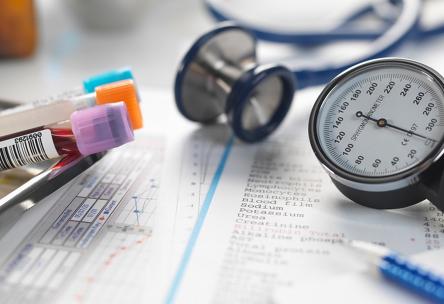Familiarize yourself with these terms before your next annual wellness visit

When you meet with your doctor for an annual wellness visit, you might hear a number of unfamiliar terms. But understanding these terms is crucial in managing your health and any conditions you might have, including diabetes, obesity, and high cholesterol.
You might hear your doctor mention the 10 terms below, so it's important to familiarize yourself with them. If you don't hear them mentioned, don't hesitate to ask about them.
Diabetes Terms
1. Blood glucose
Glucose is the main type of sugar found in your blood. Your body uses this sugar as its primary energy source. Hypoglycemia is when your blood glucose level is lower than it should be, and hyperglycemia is when it is too high.
2. A1C
An A1C blood test measures your average blood glucose level over time, typically over a two- or three-month period. It shows how much glucose is sticking to red blood cells.
Blood Pressure Terms
3. Blood pressure
Given in the form of systolic and diastolic pressure (like 120/0), this reading tells you how much force your blood exerts on the walls inside your blood vessels. Systolic pressure (top number) is the pressure when the heart pumps the blood out, and diastolic pressure (bottom number) is the pressure when the heart rests between beats.
4. Hypertension
This is when blood pressure is higher than normal, and hypotension is when it’s too low.
Cholesterol Terms
5. Lipids
These are fats in the body, and blood lipids are fats in the blood. A lipid profile is a blood test that measures total cholesterol, triglycerides, and LDL and HDL cholesterol. It’s used to gauge heart disease risk.
6. LDL cholesterol
This type of cholesterol is often called "bad” cholesterol. It is a type of fat that makes up most of your body's cholesterol, and high levels raise your risk for heart disease and stroke. LDL stands for low-density lipoprotein.
7. HDL cholesterol
This type of cholesterol is often called “good” cholesterol. It is a type of fat in the blood that helps the body get rid of extra cholesterol. HDL stands for high-density lipoprotein.
8. Cholesterol
This is found in some foods and is also produced in the liver. Your body uses it to make hormones and build cell walls.
9. Triglycerides
Triglycerides are the most common type of fat in your body.
Obesity Terms
10. Body mass index (BMI)
Your BMI is a calculation that uses your body weight and height. Overweight is defined as having a BMI between 25 and 29.9. A BMI higher than that indicates obesity.